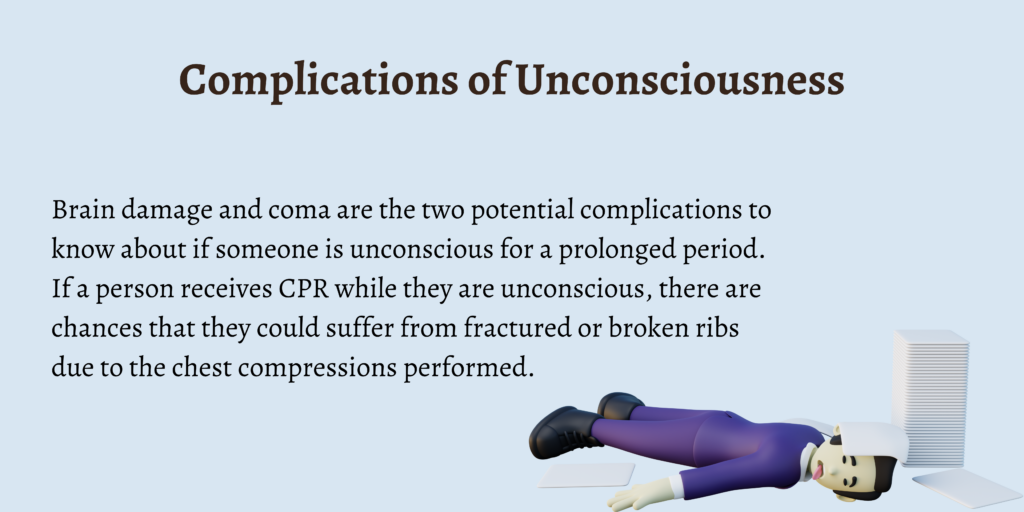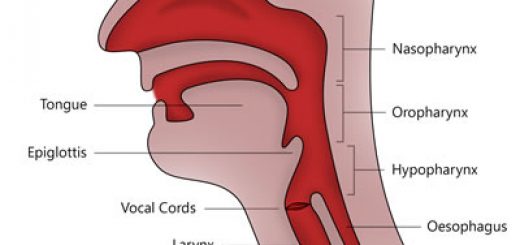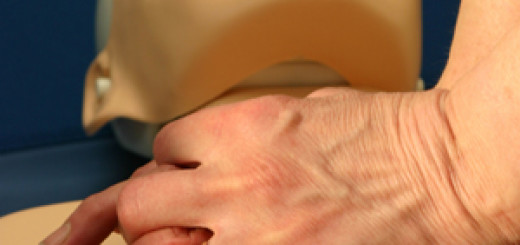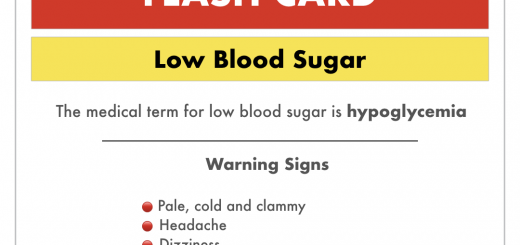Which Special Sense is The Last to Go in an Unconscious Patient?
Unconsciousness can be defined as a state in which a person appears to be asleep and can’t respond to stimuli. This unconsciousness can either last for a couple of seconds or for a longer period of time.
Unconscious individuals can have a faint pulse, and some can even stop breathing. Shaking or subjecting them to loud noises doesn’t help in such circumstances. Studies suggest hearing is the last sense to go in an unconscious person.
Therefore, calling emergency medical services is the way to help someone who has become unconscious, as the sooner they receive medical help, the better it will be for their recovery.
What Causes Unconsciousness?
Unconsciousness can be caused due to injuries or severe traumatic events. Here are some of the causes:
- Alcohol poisoning
- Severe blood loss
- Drug overdose
- Blow to the head or chest
- Car Accident
A person could also faint or experience temporary unconsciousness when their body goes through sudden changes. A couple of the causes of temporary unconsciousness include:
- Dehydration
- Low blood sugar
- Straining
- Loss of consciousness when there is no blood flow to the brain
- Hyperventilation
- Low blood pressure
- Issues with the rhythm of the heart
- Loss of consciousness caused due to a stroke, seizure, or transient ischemic attack
What Are The Indicators That a Person Can Become Unconscious?
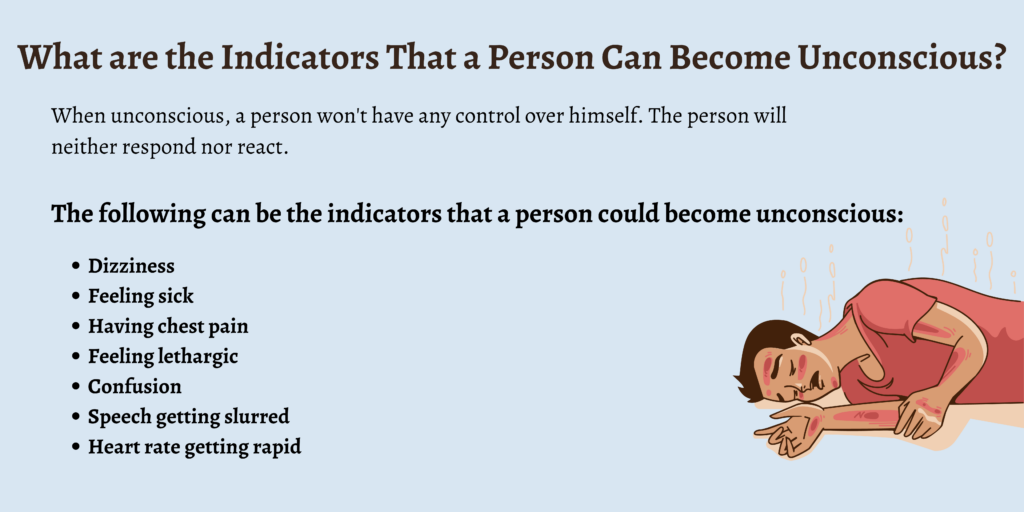
When unconscious, a person won’t have any control over himself. The person will neither respond nor react. Based on the cause behind the unconsciousness, an individual can experience it suddenly or witness it develop gradually.
The following can be the indicators that a person could become unconscious:
- Dizziness
- Feeling sick
- Having chest pain
- Feeling lethargic
- Confusion
- Speech getting slurred
- Heart rate getting rapid
Once a person recovers after being unconscious, responding and regaining complete awareness could take a while. This time could be between a few hours to a couple of days or even longer.
Some of the signs and symptoms of unconsciousness to be aware of are:
- A person might vomit
- They could appear to be asleep
- Having no control over one’s stool or urine
- Being unresponsive and unarousable
- A person’s breathing could be impaired
- Not being able to urinate or have a proper bowel movement
- Having physical movements that are involuntary, such as seizures, spasms, and jerking
First Aid For Unconsciousness
If a person is conscious, check whether he’s breathing, based on which the first aid method can be administered. The following are the ways to help an unconscious person regain consciousness, depending on the scenario:
If The Person is Breathing
- If an unconscious person is breathing, kneel next to him on the floor.
- Take the arm that’s nearest to you and place it in a perpendicular position to your body in a manner such that the hand faces upward.
- Place the other arm so that the back of their hand remains pressed against the cheek nearest you. Keep holding this position for the steps that follow.
- Use your free hand to bend the knee nearest you so that the unconscious person’s foot rests flat against the floor.
- Pull on the bent knee to help them get to their side and then roll them over.
- Lift their chin and tilt their head back to open the airway.
- Keep an eye on the patient till the arrival of medical help.
If The Person is Not Breathing
If an unconscious person is not breathing, protect their neck as you move them onto their back to provide CPR until the emergency medical service providers reach the location.
If The Person is Bleeding
If major bleeding is involved, place direct pressure on the injured area until the bleeding slows down.
- If there is the presence of a severe wound, elevate the injured body part unless it’s the head.
- Apply medium pressure on the wound.
- Assist the person in lying down.
What Not to Do
Here is what you should not do while providing first aid to an unconscious person:
- Do not leave them unattended or alone.
- Do not shake them or splash water on them.
- Do not try to make them consume water or any other liquid.
- Do not place anything under their head.
- Do not attempt to make them sit up.
Complications of Unconsciousness
Brain damage and coma are the two potential complications to know about if someone is unconscious for a prolonged period. If a person receives CPR while they are unconscious, there are chances that they could suffer from fractured or broken ribs due to the chest compressions performed.
People could also choke while unconscious because of liquids or food blocking the airway. It can be quite dangerous and also life-threatening if not attended to immediately.
How to Treat Unconsciousness
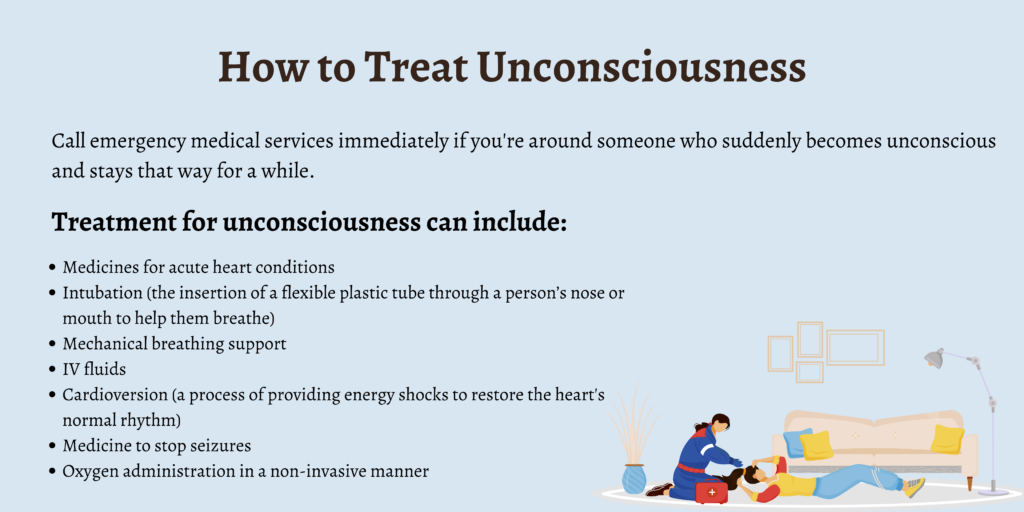
Call emergency medical services immediately if you’re around someone who suddenly becomes unconscious and stays that way for a while.
When an unconscious person is given immediate treatment, it helps save them from death and long-lasting health issues. Once urgent care addresses the immediate issue, long-term care should be provided following the initial treatment.
Treatment for unconsciousness can include:
- Medicines for acute heart conditions
- Intubation (the insertion of a flexible plastic tube through a person’s nose or mouth to help them breathe)
- Mechanical breathing support
- IV fluids
- Cardioversion (a process of providing energy shocks to restore the heart’s normal rhythm)
- Medicine to stop seizures
- Oxygen administration in a non-invasive manner
FAQs
1. What are the causes of unconsciousness?
Some of the causes of unconsciousness include alcohol, epilepsy, and trauma.
2. What are the signs of unconsciousness?
The signs of unconsciousness are vomiting, seizures, inability to urinate, and appearing to be asleep.
3. How can an unconscious person be treated?
The treatment for unconsciousness can include a glucose injection, blood pressure medication, and seizure medicines.
4. Can a person stop breathing if they’re unconscious?
Yes, a person can stop breathing if they’re unconscious.
5. Can an unconscious person have a faint pulse?
Yes, an unconscious person can have a faint pulse.
Conclusion
When a person doesn’t respond to activities, people, and various stimuli, the person is said to be unconscious. It’s important to know how to treat an unconscious person as a bystander till the arrival of medical help.
Check the victim’s vital signs and determine if they have suffered from any serious injury. Performing CPR is crucial if the patient is not breathing. Once the medical team arrives, identify the cause of unconsciousness before administering the necessary treatment.

